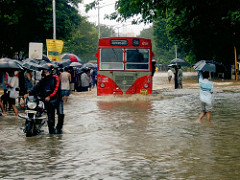When it Gets Hot and Muggy before the Monsoon Showers … Posted by Nitya on May 24, 2017 in Hindi Language
It’s the end of May and the south-westerly monsoon winds should be headed across the Western coast of India. This is the time when temperatures तापमान (taapmaan) and humidity run high, guaranteeing the impending monsoon showers बारिश (baarish) a resounding welcome स्वागत (swagat). It’s also the time when even a short errand outside can drench you in heat and sweat, making even the crispest of cotton kurtas go limp and unattractive. As such, it is not uncommon for most people to return home and take another refreshing bath that washes away the sweat पसीना (paseena) and grime मैल (mayle).
Let’s listen to this conversation between a mother and her daughter who has just returned home from school.| आ गयी | aa gayi | have come; gayi (fem.) conjugation of jaana (to go).
aa + jaana = to come |
| देखो | dekho | look (imperative) |
| कितना | kitna | how much sweat |
| पसीना छूट रहा है | paseena choot raha hai | paseena chootna = to sweat |
| ऊपर से | oopar se | used figuratively here to mean: on top of that/ in addition to it/to make things worse
literally, it means “from above” |
| भीड़ | bheeD | crowd |
| हाथ मुँह धो लो | haath mooh dho lo | wash up/literally it means to wash your hands (haath) and face (mooh). |
| नाश्ता करो | naashta karo | Eat a snack. (imperative)/ (Naashta karna) = to eat a snack |
| नहाकर | nahaakar | get showered/take a bath; nahaana = to bathe/shower |
| साबुन | saabun | soap |
| ख़त्म | khatm | finished |
| तौलिया | tauliya | towel |
| ले जाना | le jaana | to take (with oneself) |
| भूल गयी | bhool gayi | I forgot (fem.)/conjugation of bhool jaana = to forget |
| भीग गयी हूँ | bheeg gayi hoon | I am drenched (fem.)/conjugation of bheeg jaana = to get drenched/wet |

Build vocabulary, practice pronunciation, and more with Transparent Language Online. Available anytime, anywhere, on any device.





Comments:
Heather:
Can you please explain “hi”? (As used in the dialog.). Is it a form of the verb to be?
Nitya:
@Heather Hi Heather,
That’s a good question. As it is used here, “hi” (pronounced hee) is a word that adds stress/emphasis to thought/action. It can be loosely equated to mean, “I might as well take a bath” or “I think I’ll just take a bath instead of merely washing my hands and face.”
As an example, if I say “Main aaj yeh kaam karoongi,” it means “I will do this task today.” However, if I say “Main yeh kaam aaj hi karoongi,” or “Main yeh kaam aaj kar hi daaloongi,” it means that I intend (emphatically) to complete the task today.
Let me know if that clarifies things up a bit for you.
Thanks for reading and asking questions.
Nitya
Heather:
@Nitya Thank you to solving that mystery!